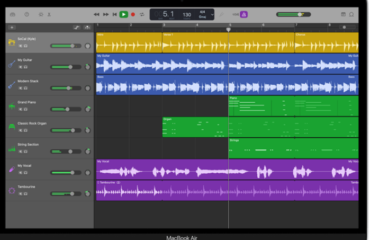Music is a universal language that touches the depths of our souls and resonates with our emotions. Whether it’s the joyous beat of a dance track, the melancholic melody of a classical symphony, or the heartfelt lyrics of a soulful ballad, music has the power to move us in profound ways.
- Music and Emotional Well-being
Emotions have a profound connection to music. It has the ability to uplift our spirits, evoke nostalgia, and help us process complex feelings. From the soulful tunes of blues to the energetic rhythms of pop, music provides a cathartic outlet for emotions, allowing us to express ourselves and find solace in the melodies.
- Music as a Stress Reliever
In a fast-paced world filled with constant stimuli, music acts as a sanctuary, offering respite from the chaos. Scientific studies have shown that listening to music reduces stress hormones, lowers blood pressure, and calms the mind. Whether it’s a soothing instrumental track or a lively tune, music has the power to transport us to a state of tranquility.
- Music and Cognitive Development
Beyond its emotional impact, music also plays a vital role in cognitive development, particularly in children. Learning to play an instrument enhances spatial-temporal skills, improves mathematical abilities, and fosters creativity. Research suggests that engaging with music at a young age can have long-lasting effects on a child’s cognitive abilities and overall academic performance.
- Music and Memory
Have you ever experienced a rush of memories when a familiar song comes on the radio? Music has a unique ability to activate neural pathways associated with memory recall. Whether it’s reminiscing about cherished moments or triggering forgotten emotions, the power of music to ignite our memories is truly remarkable.
- Music and Physical Health
Beyond its impact on mental well-being, music also influences our physical health. Rhythmic beats can synchronize our body movements, making exercise more enjoyable and enhancing our endurance. Additionally, music therapy has proven effective in managing chronic pain, reducing anxiety, and improving motor skills for individuals with neurological disorders.
- Music as a Cultural Connector
Music transcends geographical boundaries, connecting people across cultures and generations. It serves as a bridge that unites diverse communities, facilitating the exchange of ideas and fostering understanding. From traditional folk music to contemporary genres, the richness and diversity of musical expressions contribute to the vibrant tapestry of global culture.
- Music as a Source of Inspiration
Music has the power to ignite inspiration and spark creativity. Artists, writers, and innovators often turn to music to fuel their imagination and overcome creative blocks. Whether it’s background melodies while painting, lyrical poetry that evokes vivid imagery, or energizing tunes that boost productivity, music is a constant companion in the realm of creativity.
- Music and Social Bonding
From tribal drum circles to stadium concerts, music has the innate ability to bring people together. Shared musical experiences create a sense of belonging and forge deep connections. Attending live performances, singing in choirs, or participating in music festivals fosters social bonding, allowing individuals to form friendships and build communities centered around their shared love for music.
- Music as an Agent of Change
Throughout history, music has been a catalyst for social and political movements. Protest songs, anthems of unity, and calls for justice have rallied communities and inspired change. From Bob Dylan’s “Blowin’ in the Wind” to Sam Cooke’s “A Change is Gonna Come,” music has the power to ignite movements, amplify voices, and galvanize societies towards progress.
- Music and Personal Expression
Lastly, music serves as a means of personal expression, allowing individuals to share their stories, perspectives, and emotions. Whether through songwriting, composing, or performing, music empowers individuals to convey their deepest thoughts and connect with others on an intimate level. It acts as a mirror reflecting the human experience and a channel through which we find our authentic selves.
Musical Genres and their Unique Influences
- Pop Music:
- Catchy melodies and upbeat rhythms;
- Often explores themes of love, relationships, and personal experiences;
- Widely popular and appeals to a broad audience.
- Classical Music:
- Rich harmonies and intricate compositions;
- Evokes emotions and tells stories without lyrics;
- Showcases the brilliance of composers like Bach, Mozart, and Beethoven.
- Jazz Music:
- Improvisation and syncopated rhythms;
- Known for its expressive solos and complex chord progressions;
- Originated in African American communities and has influenced various genres.
- Rock Music:
- Powerful guitar riffs and energetic performances;
- Reflects rebellion, freedom, and individualism;
- Branches into subgenres like classic rock, punk, and alternative rock.
Benefits of Music Education for Children
- Enhanced Academic Skills:
- Improves reading comprehension and language development;
- Boosts mathematical and spatial-temporal reasoning abilities;
- Enhances memory retention and problem-solving skills.
- Increased Discipline and Focus:
- Learning an instrument requires regular practice and dedication;
- Develops discipline, patience, and perseverance;
- Improves concentration and attention span.
- Improved Motor Skills:
- Playing instruments involves precise finger movements and coordination;
- Enhances fine motor skills and hand-eye coordination;
- Strengthens neural connections between the brain and body.
- Social and Emotional Development:
- Engaging in group music activities fosters teamwork and cooperation;
- Builds self-confidence and self-expression;
- Provides a sense of belonging and camaraderie among peers.
The Evolution of Music Consumption
- Vinyl Records:
- The primary format for music listening until the rise of cassettes and CDs;
- Known for warm sound quality and nostalgic appeal;
- Recently experienced a resurgence in popularity among audiophiles.
- Compact Discs (CDs):
- Introduced in the 1980s, offering digital audio storage;
- Improved durability and sound quality compared to cassettes;
- Declined in popularity with the advent of digital music streaming.
- Digital Music and Streaming:
- MP3s and digital downloads revolutionized music distribution;
- Streaming platforms like Spotify and Apple Music provide instant access to vast catalogs;
- Customizable playlists and recommendations cater to individual preferences.
- Rise of Online Platforms and Social Media:
- YouTube, SoundCloud, and social media platforms allow artists to share their music directly with fans;
- Enables independent artists to gain exposure and reach global audiences;
- Facilitates collaboration and networking within the music industry.
Iconic Music Festivals Around the World
- Glastonbury Festival (United Kingdom):
- One of the largest and most renowned music festivals;
- Showcases a diverse range of genres, from rock and pop to electronic and world music;
- Known for its vibrant atmosphere and iconic Pyramid Stage.
- Coachella (United States):
- Held in California, Coachella attracts top-tier artists and celebrities;
- Blends music, art installations, and fashion in a desert setting;
- Celebrates a mix of mainstream and alternative genres.
- Tomorrowland (Belgium):
- Electronic dance music (EDM) festival known for its immersive experience;
- Features top DJs and mesmerizing stage designs;
- Draws attendees from around the world for a weekend of electronic music celebration.
- Woodstock Festival (United States):
- A historic music festival that symbolized the counterculture movement in the late 1960s;
- Focused on peace, love, and music, with legendary performances by iconic artists;
- Left a lasting impact on music and popular culture.
The Healing Power of Music
In the vast realm of human existence, music emerges as a mesmerizing phenomenon, a harmonious oasis in the turbulent desert of emotional turmoil. Throughout the annals of time, the intrinsic healing prowess of music has been revered, its tender embrace offering solace and succor to weary hearts. Delving into the labyrinthine depths of scientific inquiry, myriad studies have unfurled the enigmatic tapestry of music’s therapeutic potential, unraveling its profound capacity to assuage anxiety, alleviate the relentless burden of depression, and nurture the delicate tendrils of holistic well-being.
Intriguingly, the sonorous landscapes crafted by melodies, imbued with ethereal tranquility, can transmute the disarray within our souls into serene symphonies. The rhythmic cadence, a celestial dance between pulsating beats and mellifluous harmonies, weaves an enchanting web that reverberates through our corporeal vessels, orchestrating a symphony of physiological responses. Behold, for the very fabric of our existence pulsates in synchrony with the melodic strains. Heart rates sway like nimble reeds in a summer breeze, blood pressure quivers in harmonious resonance, and the ceaseless torrent of stress hormones is soothed by the mellifluous balm of a musical embrace.
Music in Film and Television
Amidst the vast and enchanting realm of visual storytelling, one cannot overlook the indubitable significance of music, which assumes a paramount role in augmenting the cinematic experience to unparalleled heights. It is within the tapestry of film scores, meticulously composed and tailored exclusively for the silver screen, where emotions are amplified, suspense is meticulously woven, and an enduring impact is etched onto the minds of the discerning viewers. The resonant echoes of masterpieces such as John Williams’ immortal melodies permeating the iconic “Star Wars” saga or the resounding magnificence of Hans Zimmer’s symphonic opuses interwoven within the enigmatic narrative of “Inception” reverberate through our souls, transcending the mere boundaries of reality, effectively transporting us to ethereal realms, while simultaneously arousing profound sentiments that linger long after the credits roll.
Music and Technological Advancements
Advancements in technology have revolutionized the way we create, consume, and share music. The advent of recording technology, starting with Edison’s phonograph and later evolving into vinyl records, allowed for the preservation and widespread distribution of musical performances. The introduction of compact discs (CDs) brought digital audio into our homes, offering convenience and improved sound quality. With the digital age, we witnessed the rise of MP3s, online music stores, and eventually music streaming platforms that provided instant access to vast catalogs of songs. Today, artificial intelligence and machine learning algorithms power personalized music recommendations, tailoring playlists to individual tastes. These technological advancements have democratized music, enabling independent artists to reach global audiences and empowering listeners with unprecedented access to diverse music.
Music as a Form of Cultural Expression
The symphonic symphony of melodic melodies, intricately interwoven with the tapestry of cultural fabric, unleashes a veritable avalanche of sonic sensations. With each harmonious note, music cascades through the depths of human expression, casting its enchanting spell upon values, traditions, and the ever-evolving narrative of society. From the ancestral echos of age-old folkloric tunes, painstakingly bequeathed across generations, to the avant-garde harmonies that reverberate the zeitgeist, music metamorphoses into a vessel that encapsulates the very essence of diverse cultures.
It breathes life into bygone epochs, commemorates cultural festivities, and lends its voice to the pressing concerns of the day. Whether it be the mesmerizing reggae cadences, pulsating through the veins of Jamaica, the soul-stirring strains of the flamenco guitar, coursing through the sinews of Spain, or the thunderous resonance of the taiko drums, reverberating through the very core of Japan, music serves as an ambassador, carrying the irresistible flavors of varied regions while embodying the shared tapestry of communal experiences. It binds hearts, nurtures the seeds of cultural pride, and stands as a sentinel guarding intangible heritage, ensuring that the narratives and traditions are perpetually embraced and adored by the forthcoming generations.
Music and Intellectual Stimulation
- Enhancing Cognitive Abilities:
- Research suggests that music training can improve cognitive skills such as memory, attention, and executive function;
- Playing an instrument requires multitasking, coordination, and the ability to read musical notation, all of which stimulate the brain;
- Engaging with complex musical compositions can also enhance problem-solving skills and critical thinking.
- Language Development:
- Exposure to music from an early age has been linked to improved language skills in children;
- Singing and rhyming in music helps develop phonological awareness, which is essential for language acquisition;
- Music can also support vocabulary development and enhance communication skills.
- Creativity and Innovation:
- Music encourages creative thinking and fosters innovation;
- The process of composing, improvising, and experimenting with different musical elements stimulates originality and out-of-the-box thinking;
- Exploring different genres and styles broadens artistic perspectives and inspires new ideas.
The Role of Music in Rituals and Celebrations
- Religious Ceremonies:
- Music has a significant presence in religious ceremonies and rituals across various faiths;
- Sacred chants, hymns, and devotional songs create an atmosphere of reverence and spiritual connection;
- Music enhances the emotional and transformative aspects of religious practices, guiding worshippers on their spiritual journey.
- Cultural Festivals:
- Festivals around the world are often accompanied by vibrant music that reflects the cultural heritage and traditions of the community;
- Traditional music and dance play a central role in cultural festivities, fostering a sense of identity and unity among participants;
- These celebrations serve as a platform for passing down cultural knowledge and ensuring its preservation for future generations.
- Commemorative Events:
- Music holds a special place in commemorating significant historical events or honoring notable figures;
- National anthems, memorial songs, and patriotic compositions evoke collective pride and unity;
- Music adds depth and emotional resonance to commemorations, connecting people through shared experiences and memories.
The Economic Impact of the Music Industry
The music industry not only enriches our cultural and personal lives but also plays a substantial role in the global economy. Here are key aspects of its economic impact:
- Job Creation:
- The music industry provides employment opportunities for a wide range of professionals, including musicians, producers, engineers, event organizers, marketers, and more;
- Live performances and music festivals generate employment for event staff, security personnel, and hospitality workers.
- Tourism and Destination Marketing:
- Music festivals and iconic concert venues attract tourists and contribute to local economies;
- Cities known for their vibrant music scenes, such as Nashville, Tennessee, and Austin, Texas, become cultural hubs and popular tourist destinations.
- Revenue Generation:
- Sales of music recordings, both physical and digital, contribute to the overall revenue of the industry;
- Music licensing, royalties, and streaming platforms generate income for artists, songwriters, and music publishers;
- Merchandise sales, concert ticket sales, and sponsorships further drive revenue streams for musicians and music-related businesses.
- Supporting Industries:
- The music industry stimulates other sectors, including instrument manufacturing, audio equipment production, concert venue construction, and music education services;
- Music-related media and streaming platforms create advertising and marketing opportunities for various industries.
Music and Personal Well-being
Music has a profound impact on our personal well-being, nurturing our mental, emotional, and spiritual health. It has the ability to evoke a wide range of emotions, from joy and excitement to introspection and relaxation. Engaging with music can be a form of self-care, offering solace during difficult times or serving as a source of inspiration and motivation. Whether we find comfort in soothing melodies, find release in energetic beats, or seek connection through lyrics that resonate with our experiences, music has the power to uplift our spirits, provide catharsis, and promote a sense of inner balance.
Music and Cross-Cultural Communication
Music serves as a universal language that transcends cultural boundaries and enables meaningful communication between diverse communities. Regardless of language barriers, music has the ability to convey emotions and express shared human experiences. Through its rhythms, melodies, and harmonies, music becomes a bridge that connects people from different backgrounds, fostering understanding and promoting empathy. Cultural exchange through music allows us to appreciate the rich tapestry of global traditions, broaden our perspectives, and celebrate the beauty of diversity.
Music as a Tool for Social Change
Throughout history, music has played a pivotal role in driving social change and advocating for justice. Powerful songs have become anthems for movements fighting against oppression, discrimination, and inequality. From protest songs during the civil rights movement to anti-war ballads, music has the capacity to inspire collective action and ignite a spirit of activism. Artists use their platforms to raise awareness about pressing issues, encourage dialogue, and spark conversations that lead to societal transformation. Music has the unique ability to unite individuals with a shared vision for a better world, amplifying their voices and empowering communities to strive for lasting change.
Conclusion
In conclusion, music holds immense significance in our lives, impacting our emotional well-being, cognitive development, and social connections. From its therapeutic effects on stress reduction to its ability to evoke powerful memories, music is a transformative force that enriches our existence. As we embrace the power of music, let us appreciate its profound influence and continue to celebrate the melodies that resonate within us.








